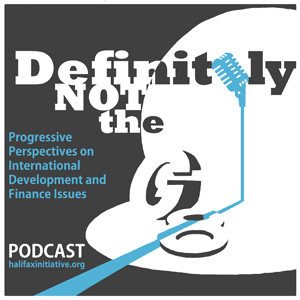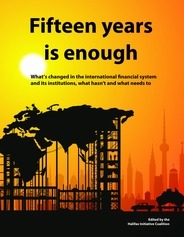The Millennium Development Goals
 |
Final script May 22, 2010; release date June 18, 2010. |
 |
Final script May 22, 2010; release date June 18, 2010. |
Bridge to South KoreaHeld in Toronto, on Monday and Tuesday, June 21-22, 2010, just ahead of the G8 Summit in Huntsville and the G20 Summit in Toronto, this meeting was intended as a strategy session for civil society organizations, platforms and networks from many G20 countries (and beyond) to discuss diverse perspectives on both the G20 as an institution and priorities with respect to its agenda. As the outcome of an initial G20 strategy meeting in Washington DC in April of 2010 among various groups, the intention of this broader meeting of national, regional and international networks was three-fold:
|
MEETING DETAILS
|
Bridge to South KoreaHeld in Toronto, on Monday and Tuesday, June 21-22, 2010, just ahead of the G8 Summit in Huntsville and the G20 Summit in Toronto, this meeting was intended as a strategy session for civil society organizations, platforms and networks from many G20 countries (and beyond) to discuss diverse perspectives on both the G20 as an institution and priorities with respect to its agenda. As the outcome of an initial G20 strategy meeting in Washington DC in April of 2010 among various groups, the intention of this broader meeting of national, regional and international networks was three-fold:
|
MEETING DETAILS
|
http://www.embassymag.ca/page/view/tax-06-09-2010
Financial transaction tax is no bank tax
By Fraser Reilly-King
Published June 9, 2010
Big banks can finally breathe a sigh of relief.
This past weekend, Canadian Finance Minister Jim Flaherty managed to rally China, Brazil and South Korea behind him at G20 meetings in Busan, South Korea, and put those pesky discussions about a global bank tax to rest.
Instead of discussing a bank tax at this month's summit, the G20 agreed to "develop principles reflecting the need to protect taxpayers, reduce risks from the financial system, protect the flow of credit in good times and bad, taking into account individual country's circumstances and options."
Innovative mechanisms for financing development, and in particular the Financial Transactions Tax
by Fraser Reilly-King, Coordinator, Halifax Initiative Coalition
May 6, 2010
My name is Fraser Reilly-King and I am the Coordinator of the Halifax Initiative, a coalition of eighteen development, environment, faith-based, human rights and labour organizations. We focus on international finance issues, in particular with respect to the World Bank, International Monetary Fund and export credit agencies.
2010 G8/G20 Canadian Civil Society Coordinating Committee
Parliamentary Roundtables on the G8/G20 Agendas
Monday, April 26th, 2010 5:00 pm - 7:00 pm Room 2-2, National Press Building, 165 Sparks Street, Ottawa
| Financial Transaction Tax
A tiny fee on the trade in financial transactions paid by banks, not by people it would raise billions of dollars for fighting poverty and climate change at home and around the world. |
2010 G8/G20 Canadian Civil Society Coordinating Committee
Parliamentary Roundtables on the G8/G20 Agendas
Monday, April 26th, 2010 5:00 pm - 7:00 pm Room 2-2, National Press Building, 165 Sparks Street, Ottawa
IMF, European Union look to bail out Greece
Greece’s debt crisis is finally coming to a head, with International Monetary Fund (IMF) loans to deal with the country’s deficit and heavy debt load being hammered out in Athens. The European Union and the IMF are negotiating the terms of a bailout as fears mount that Greece’s crisis could soon spread to other countries in Europe and beyond. Other nations carrying significant debt loads, including the United States, are concerned that the Greek crisis is a harbinger of things to come, closer to home.
Introduction
A growing number of politicians, civil society organizations, economists and some financiers have become strong advocates of a global Financial Transactions Tax (FTT). An FTT is a tiny tax on financial market transactions such as equity, bond, derivative or foreign exchange trades.
Political leaders, including the presidents of France and Germany and the prime minister of Britain, back an FTT as one of the best ways to fund programs to fight world poverty, pay for climate mitigation and adaptation costs and make financial institutions pay their fair share of the costs of the global crisis which, in large part, was created by their practices. Prominent economists advocate a Financial Transactions Tax as one way to cool down excessive speculation in financial markets, a principal cause of the economic crisis.
 What’s changed in the international financial system and its institutions, what hasn’t and what needs to
What’s changed in the international financial system and its institutions, what hasn’t and what needs toExecutive Summary
Back in 1995, the G7 met in Halifax during a “time of change and opportunity.” The meeting took place in a context of mounting deficits and debt crises in countries in the South; in the wake of economic collapse in Mexico; and amid strong global criticism from civil society, the media and governments about the World Bank and International Monetary Fund’s (IMF) austere neo-liberal structural adjustment policies.
A lot has changed since then, partly in response to the Halifax G7 Summit and subsequent G7 and G8 meetings. Too many of these improvements, however, exist only on paper. Beyond the surface, the neo-liberal, market-oriented bias that guides the Bank and Fund’s agenda and thinking has not altered.
The 2010 G8 Summit in Toronto in 2010 takes place during another “time of change and opportunity.” The financial crisis has spurred many civil society organizations (CSOs) to insist on far-reaching changes to the global financial system and its institutions. Clearly, as this publication will illustrate, 15 years of refusing to deal with the manifest shortcomings of the global economic system is enough.